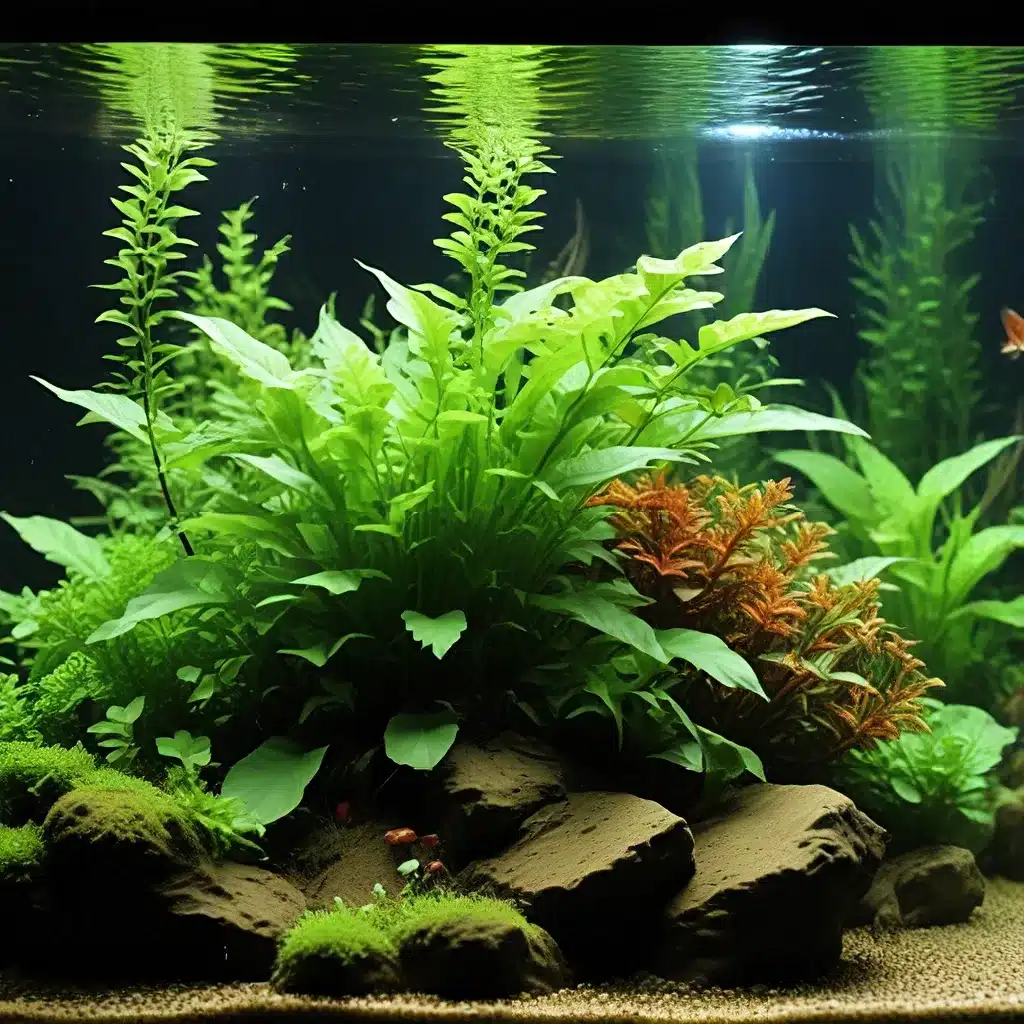
Understanding the Nutritional Needs of Aquarium Plants
Maintaining a thriving planted aquarium requires a keen understanding of the essential nutrients plants need to flourish. Like their terrestrial counterparts, aquatic plants rely on a delicate balance of macro and micronutrients to support robust growth, vibrant coloration, and healthy root development. Aquarium enthusiasts must take a proactive approach to plant nutrition, supplementing the natural nutrients provided by fish waste and decomposing organic matter to ensure their underwater garden reaches its full potential.
Macronutrients: The primary macronutrients required by aquatic plants are nitrogen (N), phosphorus (P), and potassium (K). These macronutrients play critical roles in photosynthesis, cell structure development, and overall plant vigor. Ensuring an appropriate balance of these key elements is crucial for achieving lush, healthy plant growth.
Micronutrients: In addition to the macronutrients, aquatic plants also rely on a suite of essential micronutrients, including iron, magnesium, calcium, and various trace elements. Though needed in smaller quantities, these micronutrients are equally important for facilitating enzymatic processes, enhancing coloration, and supporting overall plant health.
The Importance of Balanced Nutrition
Aquarium plants, like their terrestrial counterparts, require a well-rounded, balanced diet to thrive. While fish waste and decomposing organic matter can contribute some of the necessary nutrients, it is often not enough to meet the comprehensive nutritional demands of a densely planted aquarium. Supplemental fertilization is typically required to ensure plants receive the full spectrum of macro and micronutrients they need.
Providing a complete and balanced plant nutrition regimen offers several key benefits:
-
Enhanced Growth and Vitality: Supplying aquatic plants with the essential nutrients they crave encourages robust growth, leading to lush, vibrant foliage that adds captivating visual appeal to the aquarium.
-
Improved Water Quality: Healthy, nutrient-rich plants actively consume excess nutrients, such as nitrates and phosphates, that can otherwise contribute to algae growth. This natural filtration process helps maintain cleaner, clearer water.
-
Algae Control: Well-fertilized planted tanks can outcompete algae for vital nutrients, significantly reducing the presence of unsightly algae blooms and fostering a healthier aquatic environment.
-
Habitat Enrichment: Luxuriant plant growth provides superior shelter and breeding grounds for fish and invertebrates, improving their overall well-being and natural behaviors.
Choosing the Right Aquarium Plant Fertilizers
When it comes to aquarium plant nutrition, not all fertilizers are created equal. Aquarium enthusiasts have several options to consider, each with its unique advantages:
Liquid Fertilizers: Suitable for providing a wide range of micro and macronutrients, liquid fertilizers are easy to apply and well-suited for both root-feeding and column-feeding aquatic plants.
Root Tabs: Pressed fertilizer tablets that are directly placed in the substrate, root tabs offer a sustained release of nutrients over time, directly nourishing root-feeding plants.
Substrate Additives: Some aquarium substrates are pre-infused with nutrients or can be supplemented with specialized additives, creating a nutrient-rich environment for plant roots from the outset.
When selecting a fertilizer, it’s essential to choose a product that provides a comprehensive and balanced blend of essential nutrients, tailored to the specific needs of your aquatic plants. Following the manufacturer’s dosage instructions closely is crucial to avoid over-or under-fertilization, which can have detrimental effects on plant health and overall aquarium stability.
Monitoring and Adjusting Plant Nutrition
Maintaining a thriving planted aquarium requires ongoing monitoring and adjustment of your plant nutrition regimen. Regularly testing your aquarium water can help identify any nutrient deficiencies or imbalances, allowing you to tailor your fertilization approach accordingly.
Look for visual cues in your plants, such as yellowing leaves, stunted growth, or pale coloration, as these can be telltale signs of specific nutrient deficiencies. Addressing these issues promptly by adjusting your fertilization routine can help restore your plants to optimal health and vigor.
It’s important to remember that every aquarium ecosystem is unique, with its own set of variables and plant species. What works perfectly for one setup may not be the optimal solution for another. Remain flexible, observe your plants’ responses, and make incremental adjustments to your nutrition regimen as needed to achieve a thriving, balanced aquarium.
Conclusion: Unlock the Potential of Your Aquarium Plants
Providing your aquatic plants with the essential nutrients they require is a crucial aspect of maintaining a vibrant, healthy planted aquarium. By understanding the importance of balanced plant nutrition and utilizing the right fertilization techniques, you can unlock the true potential of your underwater garden, transforming it into a captivating and sustainable ecosystem that will leave both you and your aquatic inhabitants in awe.
Embark on a journey of aquascaping excellence by prioritizing the nutritional needs of your aquarium plants. With the right approach, you can cultivate a lush, thriving underwater oasis that showcases the natural beauty of the aquatic world.

